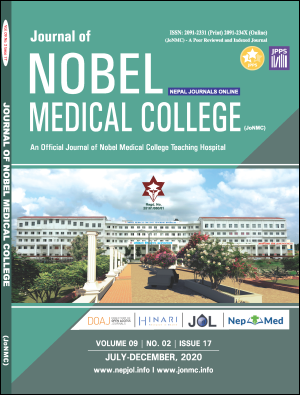Participation of Community in Prevention and Control of Dengue Fever in Dharan Sub Metropolitan City of Province No 1, Nepal
DOI:
https://doi.org/10.3126/jonmc.v9i2.33355Keywords:
Community participation, Control practices, Dengue feverAbstract
Background: Dengue fever is known as a break-bone fever and its common symptoms are headaches, high grade fever, muscular, bone pains and decrease of platelets count. Community participation involving local government and household participants in controlling breeding areas of dengue mosquitoes is the only cost-effective and sustainable activities of ensuring prevention and control of Dengue fever. This study aimed to assess the perception of the general population regarding community participation in the prevention of dengue and to verify its effectiveness with the control practices observed at the homes in Dharan sub-metropolitan city of Province No 1.
Material and Methods: A cross-sectional study was conducted among 250 households at the Dharan sub-metropolitan city of Province no. 1 in Nepal from August to October 2019. The technique of sample collection was done using purposive sampling and data were collected using a pretested close-ended questionnaire and observational checklists.
Results: Slightly over half of the respondents 129 (51.6%) reported a positive attitude regarding community practice and almost three out of five 157 (62.8%) houses were observed to have good dengue control practices. The univariate results revealed attitude of households regarding community participation were significantly associated with the control practices observed in their homes (p<0.001).
Conclusion: The study concludes that good community participation in collaboration with health volunteers and health institutions can have a positive impact on the dengue control practices at the household level. Hence, the spread of dengue out-break can be controlled by active collaborative community participation.
Downloads
Downloads
Published
How to Cite
Issue
Section
License
JoNMC applies the Creative Commons Attribution (CC BY) license to works we publish. Under this license, authors retain ownership of the copyright for their content, but they allow anyone to download, reuse, reprint, modify, distribute and/or copy the content as long as the original authors and source are cited.




